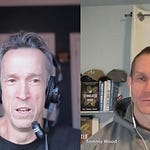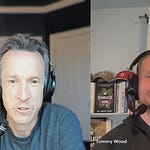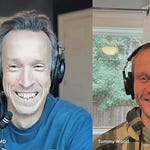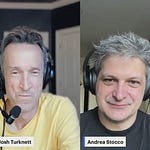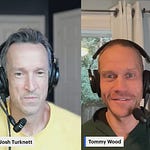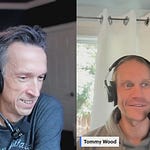The question for this episode comes from listener James in Indiana, who asks:
“I'm curious about the utility of polyphasic sleep in learning. If I am constrained to learning small chunks each day and assimilating each night, I would think I could get more than one learn and assimilate cycle in a day if I adopt a polyphasic sleep schedule. The good folks at Wikipedia point to a claim by Buckminster Fuller that he slept four times a day. If I break my sleep into four pieces and practice between each, can I learn at a pace four times faster than I would otherwise? It would be great to make a year of progress in three months."
To listen to the episode, click below. To read the edited transcript, then just keep on scrolling…
Do you have question you’d like us to answer on the podcast?
Click here to send it to us.
Josh: So I do like the spirit of this question. And as you know, I'm always looking for ways to enhance the learning process. So this is a very reasonable thing to ask. First of all, I'll just talk about polyphasic sleep. If that's not a term people are familiar with, you're probably not alone. Polyphasic sleep refers to breaking up your sleep so that instead of sleeping once per day, which would be monophasic sleep, you instead sleep in multiple shorter periods.
So why would you want to do that? Well, this idea gained traction in the biohacker community a little while back as a means of reducing your total sleep time so that you could become more productive. So in one of the more extreme protocols, you would have six 20-minute naps evenly spaced throughout the day so that you're only sleeping for two hours in a 24-hour period, and then you have upwards of six hours more in your day to do a ton of work. Yay.
So that's the general idea, and the theory behind this is that this pattern of sleep will train your brain to compress its sleep cycles into shorter durations so that you'll get all the same benefits of longer duration sleep, but in less time. The problem is that this theory doesn't have any empirical evidence to support it, and it has quite a bit that refutes it.
Based on several different reviews on questions that would relate to this particular approach, there was one review paper in 2021 specifically addressing this idea of polyphasic sleep, and their conclusion, after reviewing over 2000 papers was: "Based on the current evidence, the consensus opinion is that polyphasic sleep schedules and the sleep deficiency inherent in those schedules are associated with a variety of adverse physical health, mental health, and performance outcomes. Striving to adopt a schedule that significantly reduces the amount of sleep per 24 hours and/or fragments sleep into multiple episodes throughout the 24-hour day is not recommended."
So there's at this point not any evidence that you can get away with this approach, and lots, I think, to be skeptical of any claims at this point, and another in a long list of examples that support the adage that there's no free lunch in biology, as my friend Dr. Wood likes to say.
But regarding that question then of just whether or not polyphasic sleep in this particular way it's defined - whether that can accelerate learning, I'd say no. And given what we know of the cognitive impacts of sleep deprivation, which basically is what all those negative side effects are coming from, I'd say it's almost certainly going to undermine your learning.
“Strategic napping” can enhance learning without reducing total sleep
However, this refers to this approach where your stated goal is to reduce your total sleep time. But that is not to say that there aren't ways in which you could modify your sleep pattern to enhance learning.
And in fact, I think there are ways to use what I might call strategic napping to accelerate the learning process. The key difference with that is that you're not using it as a means of getting less overall sleep, but rather leveraging our understanding of the connection between sleep and learning and memory and practice to our advantage.
I think that the reason, the thing that motivated this question in the first place - the reason we're talking about sleep with respect to learning is because research shows that one of its major functions is to consolidate new memories, including new motor memories. If you're working on that sort of thing, almost all of the remodeling of the brain that supports long-term learning and memory happens when we sleep.
As I've talked about elsewhere, the purpose of practice when it comes to music or any skill is to stimulate that remodeling that happens when we sleep. Just like when we work out physically, we're trying to stimulate muscular growth that happens largely when we sleep. And one thing we've learned is that in order for that consolidation process to happen, you need to move through the entire sleep cycle.
So as many of you probably know, our brain moves through different stages when we sleep, each of which has its own distinct pattern of activity. And each of these cycles is likely responsible for particular functions, and the brain generally moves through all of the stages over a period of about 90 minutes, and we typically go through several of these 90-minute cycles per night. I think a lot more people are familiar with this concept now that sleep trackers are so prominent.
In one noteworthy study that was done in 2002 by our friend Matt Walker and colleagues, which was entitled "Practice with Sleep Makes Perfect," they taught subjects a finger tapping sequence in a training session, and then they tested the subjects 12 hours later. In one group, that interval included sleep, and in the other it didn't, and they found that when they retested them, only the group that had slept improved on the task, despite the interval between being the same.
That study has since been replicated in other ways, and it's also been shown using a similar design, but where one group takes a 60 to 90-minute nap and the other does not, and over a similar interval, the group that naps improves while the one that did not nap did not. Also in these cases, in both of these studies, there's a correlation found between the degree of improvement and the amount of stage two non-REM sleep, suggesting that that stage is necessary for consolidation to occur.
A specific protocol for using naps to optimize learning
So I think it's entirely possible to accelerate your progress, potentially by quite a bit, by napping strategically. So one way you could do this would be to first take a 60 to 90-minute nap, either in the late morning or early afternoon, but shortly after your first session of practice.
So you're practicing early in the day, and then second later in the day, have another session of practice, but work on something that's different than what you did in that first session.
And then third, right before bed, you could either briefly practice the thing you did from the first session, or just visualize it, do a session of visualization practice with it. The first benefit here would be that by taking that first nap, you're enhancing the likelihood and the effectiveness of consolidation of that particular practice session and the memory related to it, by shifting it closer in time to when that happens.
So there's research indicating that when it's choosing what to consolidate or what to reorganize itself for, the brain prioritizes things that happen closer to sleep. Plus, when you're napping like this, there's less competition for resources. You've only been up for maybe three to four hours, so your practice session is occupying a much larger proportion of that wakefulness data that your brain is sifting through during sleep. And again, we're giving ourselves enough time to move through an entire sleep cycle.
Another benefit would be that you're reducing the likelihood of interference by a subsequent practice session. So if you try to learn or remember something and then shortly thereafter try to learn or remember something different, those two things will tend to compete with each other and make you less likely to remember either one. This phenomenon is known as interference, and it's been shown to happen with memories of all kind.
But this is one reason why it's entirely possible for someone who's practicing or studying a lot more to make less progress than someone who's doing a good bit less. But taking a nap is kind of a way of clearing the cache and initiating the consolidation process on that first session, making it less likely that the subsequent practice will lead to interference with that memory.
And then another benefit is that the nap will also likely improve the quality of your second practice session because you'll tend to be more alert and attentive than you would be without it. And then the bit of visualization that you would do or a small practice session of the first thing you did before bedtime would be a way of signaling the brain to continue consolidating that information.
So all in all, you can see how adhering to something like that, which is all based on a solid scientific foundation, could significantly accelerate the learning process. Of course, that isn't to suggest that anyone needs to do this, and this would really be something to consider for someone who is just trying to maximize learning speed and efficiency and is optimizing for that.
But I do think that it's always fun and helpful to work through these kind of scenarios where we do ask if I'm trying to optimize for learning speed and efficiency, how might I adjust my sleep pattern?
So those are always, I think, valuable thought experiments and chances are it'll likely change how we might approach things in some way. So while polyphasic sleep might not be the answer, certainly I think there's ways to fine-tune how we sleep to enhance learning, and in general, there are many things that we can do, I think, to improve our learning efforts many orders of magnitude above what's the norm. So that's what I have there. Tommy, any questions, comments, thoughts to add?
Tommy: Yeah, when I read this question, I certainly interpreted it more as not that James was hoping to get away with less sleep, but was just thinking about breaking it up into more chunks, I imagine. Right? You know, he said 4x, so if he sleeps eight hours a night, he would now have four periods, at the end of which he would maybe sleep for two hours or 90 minutes to get one full cycle in.
And you know, if we think about what you said, there's obviously going to be a bit of a continuum between what I just described, my interpretation of James's question and what you described, right? Because at some point, you know, you have two 90-minute naps during the day, and then you have maybe a six-hour or four or five-hour period of sleep at night. That starts to look a little bit like what James was maybe describing.
So, do you imagine - and first we have to imagine that you're in a scenario where you can essentially completely reorder your social life and calendar such that you are optimizing learning, right? Which is what this essentially requires. That's your top priority in life, right?
Exactly. You have suddenly decided that you want to quit being a neurologist and become, you know, a professional basketball player, right? And you've got to improve your jump shot. And so you're going to completely reorganize your life in order to do that. Is there some point between those two where you think you get this - there's likely to be diminishing returns because I think some other stuff starts to come into play? Like you said, like how much time can you really spend with good focused attention on skill learning? Like how many bouts can you do? So I just wondered where - one nap and two focused learning periods, you know, minimizing interference, that sounds like a pretty solid choice if somebody is able to do that, but you know, where does further breaks and further naps maybe become counterproductive?
Josh: Yeah. And when I was trying to think of a sample protocol that would try to sort of integrate some of what we know and reap some of those benefits, but make it doable without the downside - that was kind of what I thought would tick those boxes because you could conceivably try to break it up even more and still try to manage and not result in sleep deprivation, right?
And conceivably, in a perfect scenario, conceivably have a nap after every time you practice, right? You could practice multiple times per day and a nap every time and conceivably accelerate consolidation process. However, I don't think most people could pull that off. I don't think that most people could pull off multiple 60 to 90-minute naps per day.
Tommy: I was just wondering if you're going to generate enough sleep pressure to do that. That's exactly -
Josh: Exactly. Unless you build up some significant sleep deficit at some point.
Tommy: Right.
Josh: So I don't think it's doable, even though in theory that it might work. And I agree, I think James is probably thinking just like you were, but that whole polyphasic sleep stuff is - as primarily the way it's talked about as a way of sort of cheating your total sleep time. And I should mention too, you know, many cultures do have naps integrated into the day, you know, siestas and things like that. And what we refer to as biphasic sleep. So there's plenty of precedent for that sort of thing.
And I think that that seems like a very healthy pattern and one that's we know is very doable and practical, and if you timed it, if you were thinking about timing it around your practice, kind of an easy way to maybe augment the learning process in a way that you know is likely to work.
Non-sleep rest periods can also support learning and memory consolidation
Tommy: So one thing then - this is not related to the question but wasn't sort of within the question - but what about non-sleep rest approaches? You know, there's certainly some evidence in like motor pattern learning where after you learn the motor pattern you do some kind of breathing exercise or meditation type exercise.
So you're down-regulating - obviously, you're not getting into stage two sleep, which you mentioned was critical, but that does seem to accelerate consolidation. You know, maybe not quite the same as sleep, but certainly in the same direction. So do you think that that would be an additional add-on here if we're trying to maximize everything or again, are we starting to major in the minors?
Josh: Yeah, no, I think that's a very good thing to be mindful of. I think especially these days, I think we all just - it's too prone to going from one super stimulating thing to another, right?
Tommy: Yeah.
Josh: And especially if so, in today's world, if you're trying to learn something complex, like an instrument or whatever, it's definitely desirable to have a period of cognitive rest after you've practiced. And yeah, you know, there are probably several different reasons why that would be beneficial. But you could think of it in the same way you think about exercise. You don't just run from one exercise to the next. You give yourself a time to rest, and the benefits there are likely similar.
First of all, you only have so many resources to devote to something, you know, your attention and so forth to devote to learning. It's easier to feel when those are depleted in the physical realm, but you know, the same thing is happening in the brain. So giving time just to replete those resources is good, but I think that there's also benefits in terms of helping to ensure that that particular memory will be consolidated later on if you do include a period of rest - for one, simply because you're reducing chances of interference from whatever next thing you might jump right into and then overwrite that.
So yeah, I think all in all, definitely room for rest. You know, one of the reasons this phenomenon of polyphasic sleep was kind of caught on was that there are some stories of some famous people, including people, you know, creators and inventors and so forth who would sleep in these unusual patterns.
And in several of those cases, it was less about productivity and more about trying to get themselves in that sort of liminal zone between sleep and wakefulness, where ideas tend to emerge, that you kind of can't access in other ways. So people who were relying on their creativity realize that some of their best ideas happened in that space. So using some kind of polyphasic sleep was actually a way of entering that time where you're half asleep, half awake, more often - not necessarily a productivity gain, but maybe a creativity gain.
Tommy: You know, I've heard about that, particularly with Salvador Dali - apparently slept in an armchair holding coins above a metal plate.
Josh: Exactly.
Tommy: As he fell asleep, the coins hit the plate and it woke him up.
Josh: Exactly. Yes, and there are some others. I can't remember if maybe Edison had some practices related to that. But yeah, and so a lot of people have recognized that being sort of half awake is helpful and so you can imagine if you're only napping 20 minutes six times a day that you'd be walking around in that state quite a bit.
Tommy: At that point, it might just be hallucination.
Josh: The quality may diminish. There's probably a sweet spot. I will say to my empirical experience with polyphasic sleep, forced polyphasic sleep in medical school and residency, it did not lead to improvements in productivity.
Tommy: I can attest to that as well. I tried that in my final year as an undergraduate and it just led to severe mental distress.
Josh: Yeah. So I don't recommend it.
Tommy: An unplanned addition - many of the things that you talked about today, learning optimization, the effect of interference, the importance of focus - it reminds me of a book that I read recently. And I think written by Dr. Josh Turknett, called "Anyone Can Play Music." I wonder if this is a good time for a plug of said book.
Josh: Well, I appreciate that. That was not set up. But indeed, the book "Anyone Can Play Music" will be out in March of next year, talks about all of these concepts related to enhancing the learning process, and why learning is so good for us. So it's going to be out in March, excited about that. And it is now available for pre-order, wherever books are sold. Thanks, Tommy.
Tommy: Sure. Thank you.
Josh: All right. Well, if you guys have any questions related to brain health and fitness or learning neuroplasticity, send them our way at brainjo.academy/questions. Thank you, James, for that question. And we'll see you guys in the next episode. Bye.
Tommy: Thanks everybody.






